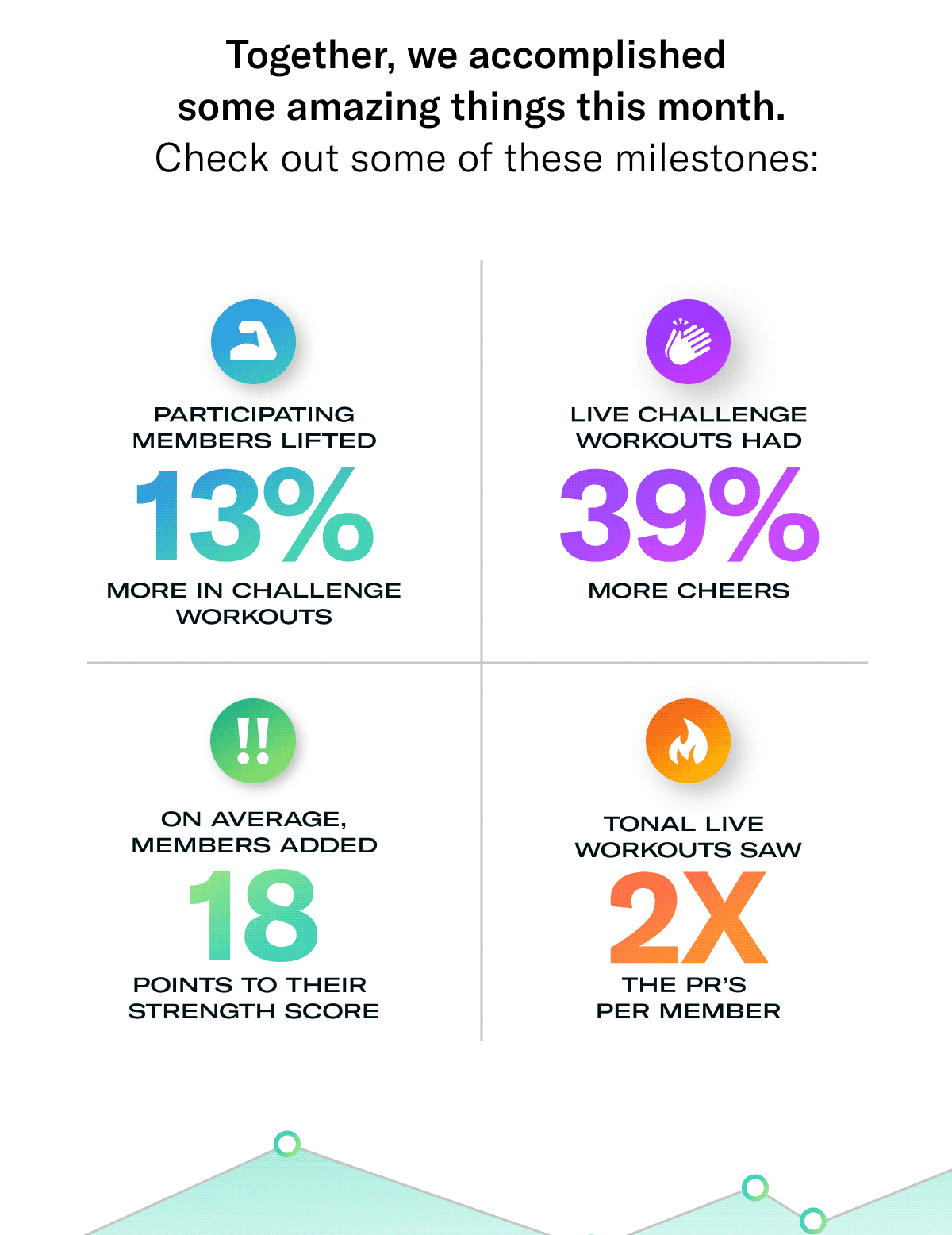Your year is off to a strong start. Now keep that energy going straight into the next month.

This year, we ditched the old New Year, New You adage. Instead, the Four-Week Fast Track Challenge, Tonal’s first live and multi-modality workout program, encouraged you to be the same you, only stronger. Since 63 percent of people fall off the healthy habits wagon within the first three months of the year, according to one study, Tonal scrapped the full-scale overhaul strategy in favor of smaller, more manageable changes designed to help you build habits that last long-term.
And it worked. As of this week, nine of the top 10 Live workouts by total PRs were part of the Four-Week Fast Track Challenge, and on average, members added 18 points to their Strength Scores.
While this challenge is ending, your goals aren’t going anywhere. Here are seven key takeaways we learned from the challenge to help you keep the momentum going all year long.

If you think you need to spend hours in the gym, think again. Just three 13-minute strength sessions a week are enough to start seeing muscle gains, according to one study published in Medicine & Science in Sports & Exercise. That’s fewer than 40 minutes a week to boost your physical health and self-esteem and prevent anxiety and illness.
It’s not always easy, but there are consistency-forming strategies to help you get there. Start by finding a workout window that fits inside your schedule. Remember, you need as little as 13 minutes. Then give yourself some prompts like leaving your workout clothes out the night before to make fitting in movement as easy to accomplish as possible.

Weekly and monthly workout calendars were an important element of the Four-Week Fast Track Challenge, and for good reason: A study published in the Journal of Sport & Exercise Psychology shows action planning is an essential component to staying on track.
Even without a challenge on deck, you can create your own action plan or calendar with a training journal or build training time into your daily schedule. When you do, make it specific. Write down exactly which workout you plan to do, and whether it’s on or off Tonal. Include as many details as possible. Research shows that a detailed approach can improve behavior adherence.
But it’s not just the workouts. Nutrition planning is also paramount. Meal-prepping is one convenient way to stay consistent. A study published in the Internal Journal of Behavioral Nutrition and Physical Activity found that meal-prepping helped encourage a healthier diet, too. For the January challenge, Coaches Gabby Sansosti and Trace Gotsis shared some of their favorite recipes to meal-prep, most of which you can knock out in under 30 minutes or less.

In addition to strength training, the Four-Week Fast Track Challenge was designed to help you build a stronger routine by also focusing on mindset, recovery, and overall well-being. Each week featured meditation sessions, as well as supplemental mobility and recovery workouts, designed specifically to help you rebound after tough strength training workouts and allow your mind to rest, too.
Moving forward, remember that recovery is as essential to your routine as moving weight. And if you’re feeling super sore after a few days, rest days are important, too. There’s evidence that shows taking time off from stressing your muscles allows your body to respond to new demands.
Just as some workouts are built to target specific parts of the body, you can employ exercises that target your mindset, mobility, and recovery. Work on focus and motivation in a meditation session or add mobility sessions to supplement your strength work going forward.

Working out is only part of the equation. How you fuel matters, too. Eating healthy doesn’t have to be restrictive. “I don’t believe in depriving the body of anything,” says Coach Gabby, who believes eating healthy means enjoying all foods including dessert. “It’s about moderation and making subtle, healthier choices.”
Try to avoid the approach that requires you to strip foods from your diet. Instead, consider adding more of the foods that best support your goals and activity level. Research suggests athletes should consume protein-rich foods at least four times each day, rather than larger doses one to two times per day. And experts agree, recommending athletes include protein at every meal and at least one-protein rich snack to maintain lean muscle.
Focusing on one step, like adding more protein to every meal, can build a healthy habit you can rely on long-term, fuel your body, and aid muscle recovery. For quick ways to ease into upping your intake, try some of these protein-packed recipes: spinach and feta mini frittatas, spicy coconut dal, turkey meatball snack bites, and frozen yogurt.

Optimize your training and health by ensuring you are properly hydrated, especially if you sweat hard. Research suggests that drinking more water can help improve exercise performance. One small group study found that when participants had 225 milliliters of water within an arm’s reach while working out, they performed significantly better. But to stay properly hydrated for your performance, authors Dr. Dana Cohen and Gina Bria suggest there’s more to it than just guzzling gallons of water.
To support members in their Four-Week Fast Track effort and fitness goals for 2022, the Tonal community book club tackled Quench: Beat Fatigue, Drop Weight, and Heal Your Body Through the New Science of Optimum Hydration. In this book, Cohen and Bria share science-backed strategies to help optimize hydration for daily activities, performance, and training. According to Quench, you can eat for hydration with fruits and vegetables, and gel-based foods like chia seeds (try adding them to oatmeal).

Related Story: Post-Workout Hydrating Smoothie Recipe

The cool part of a Live program is that we can all root for each other along the way. The challenge workouts had 39 percent more cheers per user than other non-challenge workouts, and athletes lifted an average of 13 percent more per person, according to Tonal data. There’s real power in those numbers.


One of the most important components of the Four-Week Fast Track challenge was concentrating on progress instead of perfection. “The number one thing to remember is you don’t have to be perfect to be great,” says Coach Trace.
Maybe you missed a workout here or there but instead of dwelling on that, take your momentum forward by focusing on what you did do. Some of us felt more energized, added recovery and meditation to our routines, plugged in more protein, fruits, and veggies, and completed a guided program or a Live workout for the first time. (One of us even hit a 30-million pound milestone!) Acknowledging what you accomplished is important for self-efficacy.
“We get so caught up on the finish line and measuring the goal. If we continually monitor our progress, we ground ourselves in the journey, and boost our self-confidence. Then, if we happen to slip up, we can give ourselves some grace and jump right back into it,” says Coach Trace.
